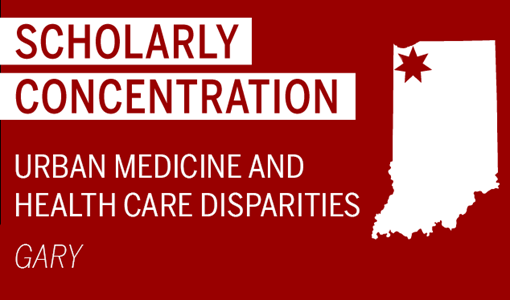In 2019, IU School of Medicine launched Scholarly Concentrations. To help students decide if a concentration topic is the right fit, concentration co-directors shared the inside scoop—from why they got involved in the concentration to how a specific topic can help students reach their goals
Topic: Urban Medicine and Health Care Disparities
Location: Gary
Co-directors: Amy Han, PhD, and Elizabeth Ryan, EdD
Introduce yourself. Who are you and why did you decide to become involved in this Scholarly Concentration topic?
Amy W. Han, PhD, is the director of clinical education at the Northwest campus of IU School of Medicine. Having been in the medical community for over twenty years and sitting on the board of one of the largest FQHC’s in Northwest Indiana allows Dr. Han to utilize the myriad of resources from this region to help our student doctors address urban health challenges and issues of healthcare disparities in the underserved population.
Tell us about your experience related to the concentration topic.
Han: Early in her career as a psychologist, Dr. Han worked in a community mental health agency, serving a large portion of the underserved who sought services in this setting. She quickly understood that treating the mental health within this population also included a host of other services. Working within a team allowed for a more comprehensive way of treating clients.
What are you most excited about in regards to Scholarly Concentrations and/or your concentration topic?
Han: Dr. Han is most interested in the many different topics, projects, and community partnerships that our student doctors will engage in. Most exciting will be the end result of a hopefully fulfilling journey for each student.
What are the two or three most important or interesting things students should know about this concentration?
- Students will research the causes of urban health problems and issues related to healthcare disparities and evaluate policies and innovative solutions to urban challenges
- We will invest in training you as urban health leaders while you build new partnerships and strengthen existing community partnerships
How is this concentration beneficial to a student’s personal and professional goals?
Regardless of what specialty a student chooses to pursue, understanding urban health challenges and working with the underserved population will be invaluable. Residencies will find this to be desirable because of the added knowledge and perspective that you will add to their program.
What are the special resources and/or expertise on this concentration’s home campus? (i.e. what special resources or personnel make the campus uniquely suited for the concentration).
Northwest Indiana is very rich in medical resources. IUSM-NW partners with 9 full service hospitals; 5 Federally Qualified Health Centers (FQHC); and 3 community mental health agencies to serve the clinical education for all four years of IUSM-NW medical education.
What is the academic and social culture like on the home campus?
IU School of Medicine, Northwest, is a small and close-knit campus. The professors and staff are very approachable and espouses an “open door” policy.
You provided some examples of project topics for this concentration. Can you also provide some more details and examples of what one or two different projects could look like?
Project: P.O.P. (Project Outreach and Prevention) on Youth Violence
The use of an intervention program such as Students Against Violence Everywhere (SAVE) has been documented as effective in decreasing fights and other negative incidents in schools (Helgeson 2015). Project Outreach and Prevention (POP) on Youth Violence will be partnering with students to establish SAVE chapters in middle schools and high schools in the Chicagoland and Northwest Indiana area to reduce the amounts of fights and other negative behaviors prevalent in those schools.
Project: Stroke Specific Education on Stroke care in the Underserved
By implementing stroke specific education and program changes at St. Catherine Hospital (a primarily Hispanic population in East Chicago), the study will utilize Community Health’s Comprehensive Stroke Center, the first of its kind in Northwest Indiana. This access to care will change the landscape of stroke care in the underserved by providing the highest level of quality service for all patients regardless of their ability to pay.
